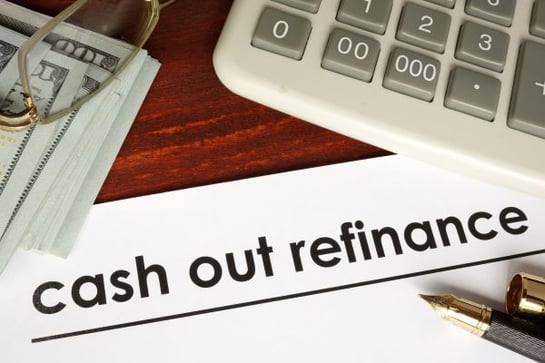Table of Contents
Exploring Creative Financing for Real Estate Success
Investing in real estate can be an exciting and profitable venture, but traditional financing methods may not always be the right fit for every investor. This is where creative financing comes into play. Creative financing offers alternative methods to fund deals, allowing investors to think outside the box and tailor financing options to their specific needs. In this blog, we will unravel the concept of creative financing, explore different techniques and strategies, and discuss the advantages it offers. Whether you're new to property investment or looking to expand your portfolio, understanding creative financing can open up new opportunities for success. Let's get started on this journey of exploring your options for success.

The Concept of Creative Financing
When people think of applying for a loan, traditional methods such as mortgage loans and bank loans typically come to mind. However, creative financing ideas go beyond the realm of traditional financing. Creative financing is a term used to describe the use of non-traditional methods to secure funding for deals. It involves thinking outside the box and exploring alternative options such as private money lending to purchase properties or fund projects. By leveraging private money loan strategies, investors can overcome traditional limitations and find unique ways to finance your next investment.
Creative Financing Ideas
Private money loans are a popular alternative to traditional bank loans, offering borrowers a quick, flexible and personalized lending experience. These loans typically involve borrowing from an individual or a private organization, rather than a financial institution. Private money loans can be beneficial for those who may not meet the strict requirements of traditional lenders or who need quick access to funds. While interest rates on private money loans may be higher, the approval process is often faster and more lenient, making them an attractive option for many borrowers. Whether you're looking to fund a real estate investment or need capital for a business venture, private money loans provide a viable solution with fewer hurdles to clear.
Private money lenders evaluate the investment property and the borrower's track record, rather than solely relying on credit scores and income documentation. These flexible loans typically have shorter terms and higher interest rates, but can be an excellent option for investors looking to act quickly or those with credit challenges.
Here is a summary of the different types of private money loans.
- Bridge Loan: A bridge loan is a short-term loan that provides immediate cash flow, typically used by individuals or businesses to cover expenses until more permanent financing can be secured. It acts as a "bridge" between the gap in funding, allowing the borrower to meet their financial obligations without delay. These loans are usually secured against an existing property or asset and are intended to be repaid quickly once more stable, long-term financing is obtained. They offer flexibility and quick access to capital, making them a valuable financial tool for those in need of temporary financial assistance.
- An owner-occupied bridge loan is a short-term financing option that allows homeowners to purchase a new property before selling their current one. This type of loan is typically used when there is a timing gap between buying a new home and selling the existing one. Owner-occupied bridge loans are secured by the homeowner's current property and can help cover the down payment and closing costs for the new home. Once the existing home is sold, the proceeds are used to repay the bridge loan. This type of financing can be a valuable tool for homeowners looking to transition smoothly from one property to another without facing financial constraints.
- A construction or "fix & flip" loan is a type of loan designed specifically to fund the building or renovation of a property. This type of loan differs from traditional mortgages in that it is typically short-term and is used to cover the costs of construction as they occur. Construction loans can be used for a variety of projects, including new home construction, major renovations, or even commercial developments. During the construction phase, borrowers usually make interest-only payments based on the amount drawn from the loan to cover construction expenses. Once the project is completed, the construction loan can be converted into a traditional mortgage or paid off in full.

Additional Creative Financing Options
Seller financing, also known as owner financing, is another alternative lending option. In this scenario, the property owner acts as the lender, financing the purchase directly with the buyer. This option can be beneficial for those who may not qualify for traditional loans or prefer to bypass the stringent requirements of conventional lenders. Seller financing allows for more negotiation on interest rates, payment terms, and closing costs, making it an attractive option for both buyers and sellers.
Lease options are another alternative source of funding where the investor leases a property with the option to purchase it at a later date. This strategy provides the investor with the opportunity to generate cash flow from rental income while locking in the purchase price of the property. Lease options are particularly useful for investors who need more time to secure a permanent lender or want to test the property's potential before committing to a purchase.
Lastly, a self-directed IRA is another strategy for funding real estate investments. Exploring how a self-directed IRA serves as a smart retirement plan for real estate ventures, investors leverage retirement funds for real estate investments. Diversifying savings into real estate enhances long-term growth potential, offering tax advantages to investors. By utilizing a self-directed IRA for real estate, investors secure their financial future through passive income and appreciation. This strategy allows investors to tap into the value of their retirement accounts to expand their investment portfolio in real estate properties, paving the way for a prosperous retirement.
Overall, creative financing methods offer investors the ability to finance their investments in ways that suit their specific needs and investment goals. By exploring these options, investors can find funding options beyond the traditional mortgage loan model, opening up new doors of opportunities.

How Private Money Loans Differs from Traditional Loans
When it comes to traditional loans, investors typically rely on mortgage loans offered by banks, credit unions, or other financial institutions. These loans have set interest rates, loan terms, and specific requirements that borrowers must meet. Traditional lending options are based on the purchase price of the property, the borrower's creditworthiness, and their income, among other factors.
In contrast, private money loans provide investors with more flexibility, customization, and options to structure their loan terms. Rather than being limited to the loan terms of traditional loans, private money loans allows investors to negotiate specific terms that align with the needs of both parties involved.
Using Private Money Loans to Finance Rental Properties
Using private money loans to finance rental properties can be a strategic move for real estate investors looking to expand their portfolios quickly. Short-term funding, typically provided by individuals or private organizations, offer more flexibility and faster approval processes compared to traditional bank loans. This can give investors a competitive edge in securing deals and increasing their property holdings. However, it's crucial for borrowers to carefully consider the terms of the private money loan, including interest rates, repayment schedules, and collateral requirements, to ensure that the investment remains profitable in the long run. By leveraging private money loans effectively, investors can access the capital needed to grow their rental property business efficiently.

- Cash-Out Refinance: Turning Home Equity into Investing Capital
A cash-out refinance involves refinancing an existing property and extracting cash from the equity built in the property. It provides investors with the opportunity to access additional capital without the need for a traditional loan.
By refinancing, the investor can borrow against the equity, receive the funds as a lump sum, and use the cash for real estate investments or other purposes. Investors can potentially increase their cash flow through additional properties or property improvements. - Bridge Loans: A Short-Term Financing Solution
For real estate investors, bridge loans can provide a valuable short-term solution. Secured by the property itself, these loans facilitate quick transactions and rapid access to funds, ideal for time-sensitive investments like fix-and-flip projects. By leveraging hard money loans, investors can seize opportunities promptly and navigate the real estate
market with agility and financial flexibility, making them a strategic tool. - Cross Collateral: Using Existing Property as Leverage for Financing
Cross collateralization is a financing strategy where a borrower uses an existing property as leverage to secure a loan for another property or financial need. By offering more than one property or asset as collateral, borrowers can potentially access larger loan amounts or better interest rates. This approach can be beneficial for individuals looking to expand their real estate portfolio or secure additional funding without liquidating existing assets.
Leveraging current real estate assets to secure financing for new investments can be a beneficial option for those looking to expand their real estate portfolio or make additional investments without having to put up additional cash. This approach offers the opportunity to expand investment horizons by leveraging the value of owned properties in the pursuit of new ventures, without solely relying on traditional lending methods.

Addressing Common Queries about Private Money Lending
Understanding how to acquire a property without relying on standard loans is crucial for investors exploring unconventional avenues for financing real estate ventures. Exploring strategies to invest with bad credit and no initial capital through creative financial mechanisms can open up new opportunities for individuals looking to enter the real estate market without the constraints of traditional banking requirements. Leveraging various options beyond typical bank loans can provide flexibility and opportunities for property acquisition, regardless of credit scores or existing financial situations.
Can a borrower ask for personalized financing structures?
Private money loans offer tailored financial solutions, catering to individual needs and providing flexibility in real estate lending. With a personalized approach, securing funding for real estate deals becomes efficient, expediting transactions. By utilizing private money lenders, investors can explore various financing structures, considering factors like interest rates, loan terms, and collateral options, enhancing their investment strategies and diversifying their portfolio effectively.
Can You Buy Properties with Bad Credit and No Money Down?
Buying properties with bad credit and no money down can be challenging but not impossible. There are some options available for individuals in this situation, such as working with private lenders like Red Tower Capital. Private lenders may be more flexible with credit requirements and down payment terms, although interest rates may be higher.

Is Creative Financing the Future of Real Estate Investing?
Exploring the evolving landscape of real estate investment, creative financing emerges as a leading trend. Innovative financing methods shape the future, revolutionizing real estate investments. Assessing the viability and potential of creative financing unveils a promising strategy for investors.

Why do private money lenders use creative payment plans?
Private money lenders use creative payment plans to attract borrowers and differentiate themselves in a competitive market. By offering flexible terms, such as interest-only payments or balloon payments, they can cater to borrowers who who require customized financing solutions. This approach can lead to mutually beneficial agreements that help both parties achieve their financial goals effectively.
Conclusion
Creative financing offers real estate investors innovative solutions to secure funding and maximize investment opportunities. By leveraging techniques like cash-out refinancing and bridge loans, investors can unlock new avenues for growth and profitability. The advantages of creative financing are vast, providing flexibility and tailored options for diverse financial situations. As the real estate landscape evolves, creative financing emerges as a strategic tool for success. To explore how creative financing can elevate your real estate endeavors, get in touch with us today.
.svg)